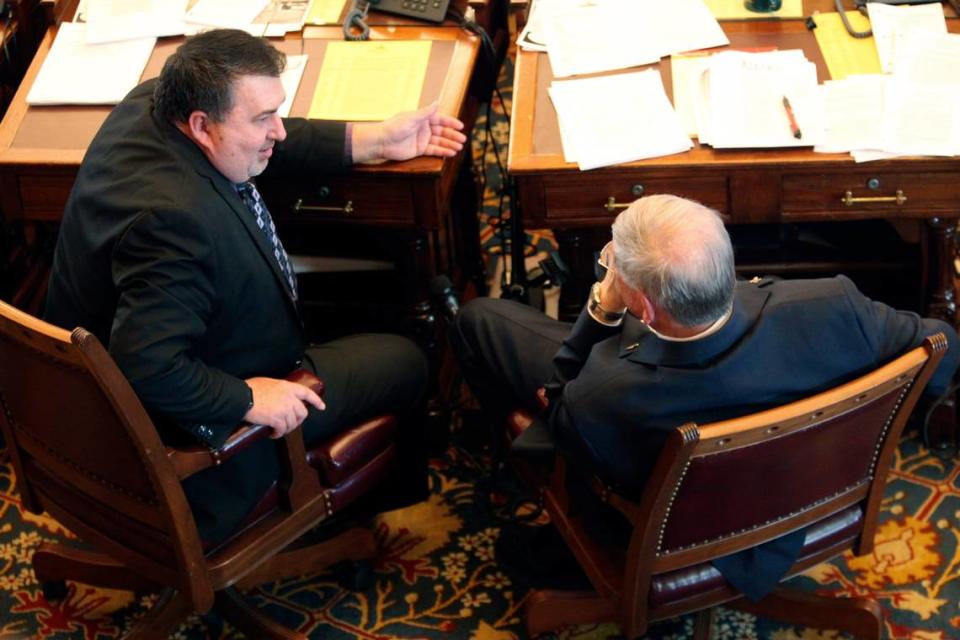As Kansas Labor Department heads for overhaul, lawmakers approve greater oversight
A bill granting the Kansas Legislature greater oversight over the Kansas Department of Labor is headed to Gov. Laura Kelly’s desk as the agency begins a long-anticipated modernization of outdated technology.
The new KDOL oversight committee will be charged with investigating fraudulent payments, adjusting payment scales and infusing federal dollars into the state’s depleted unemployment fund.
After passing individual bills last month, the Kansas House and Senate approved a compromise bill Friday.
The bill comes after a year of crisis within the state’s unemployment agency. The agency is on its fourth secretary within a year after an unprecedented number of unemployment claims were made due to the COVID-19 pandemic. The state’s 1970s era computer system buckled as staff members rushed to set up two federal programs authorized last year.
Thousands of Kansans have complained they received unemployment benefits late or not at all.
“Once this system is implemented you’ll never see that kind of situation happen in the next several years,” said Sen. Rob Olson, an Olathe Republican.

On Tuesday, the Department of Labor announced it had begun its request for proposals for the new information technology system.
The agency hopes to begin installing the system in 2023, Secretary of Labor Amber Schultz said in an interview Tuesday.
“It’s going to be an interface that’s much more user friendly,” Schultz said. “Part of the frustration I see right now from the user experience is we have so many cobbled-together systems. We’ve got the mainframe from the 1970s, we’ve got somewhat modernized technology from the early 2000s and some technology we’d consider a little bit more modernized from the early 2010s.”
If the governor signs the bill, a panel of lawmakers and stakeholders will have a say in the agency’s search and installation of a new IT process. The bill allows legislative leaders to place a deadline on completion.
The Unemployment Modernization and Improvement Council created by the bill would perform an audit of the unemployment insurance system, recommend changes and work with the secretary of labor to plan for major increases in claims, among other things. The committee would be formed within 14 days of the bill’s passage with the governor’s signature and will implement the modernization process “in consultation” with the labor secretary.
“I think there’s going to be a lot of eyes on this and I think we’ll have successful implementation,” said Sen. Tom Holland a Baldwin Democrat.
Though she was concerned about the possibility of a deadline, Schultz said she looked forward to work with the Legislature.
“We’re excited actually,” Schultz said. “We are more than willing to collaborate and get the best system we can in Kansas because they deserve that. The more partners we have helping us along, the stakeholders, the better.”
In a statement, Friday, Gov. Laura Kelly thanked the Legislature for approving the bill.
“This legislation will ensure that we complete the work we started and replace the state’s antiquated unemployment system. The passage of this legislation makes clear our commitment to Kansas businesses and workers to ensure that we are prepared for whatever challenges the future may hold,” Kelly said.
In addition to overseeing the modernization process, the bill takes action to remedy damage done by fraudulent claims in the past year.
The Kansas Department of Labor predicts $300 million was paid out in fraudulent claims since March 2020. A bipartisan legislative audit put the figure closer to $600 million. A third party, independent audit is expected to be completed in September.
The bill infuses $250 million of federal relief dollars into the state’s unemployment trust fund and sets aside another $250 million to be used if the independent audit shows a higher amount of fraudulent payments.
“It was always our intent and our promise to the business community that we would make them whole on all these dollars that they paid into an account and we let it go because we didn’t watch them right,” Rep. Sean Tarwater, a Stilwell Republican, said.
The bill also allows individuals who had fraudulent claims in their name to report unemployment fraud directly to their local sheriff’s office rather than contact the Department of Labor.
“It’s just another venue because sometimes people had a hard time getting through to the labor department,” Olson said.
The council will be required to investigate the effects of fraudulent claims and how they came about.
New systems were installed earlier this year to prevent further fraud.
“We’ve estimated that we’ve prevented about 500,000 fraudulent claims, which would have totaled to about $22 billion,” Schultz said. “The fraud is not just a Kansas issue, it’s a national issue.”

